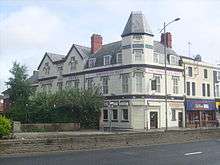Scotland Road

Scotland Road or "Scottie Road" is the A59 and is situated near the docks in the Vauxhall area of north Liverpool, England.
History
Scotland Road was created in the 1770s as a turnpike road to Preston, Lancashire, via Walton, Liverpool and Burscough. It became part of a stagecoach route to Scotland, hence its name. In 1803, it was partly widened, and streets of working class housing laid out either side as Liverpool expanded. Scotland Road was at the centre of working class life for the people of the surrounding Everton, Vauxhall, and Islington, areas near the north Liverpool docks and Liverpool city centre.
The population in Victorian times was swelled by the arrival of thousands of Irish migrants, many of whom had fled Ireland's Great Hunger. The area became known for having numerous Irish-Catholic residents. The Liverpool Scotland UK Parliament constituency was represented by an Irish Nationalist MP until 1929.
Decline
The area had a vibrant community but was often associated with poor housing, poverty, violence, and sectarian divisions. Many dwellings in the area were demolished in the 1930s, and replacement housing included corporation flats. After World War II ended, in 1945, many residents were rehoused in new council houses in areas such as Croxteth, Kirkby, Huyton, Norris Green, and Stockbridge Village, leaving Scotland Road in a state of steady decline. Housing was further cleared by the construction of the second Mersey tunnel. There were once 200 public houses in the Scotland Road area, but most of them have now gone.
Scotland Road Free School
Scotland Road Free School was a short-lived example of democratic education established 1970 by two local teachers. It was based at Major Street, just off Scotland Road. A related project, Liverpool Community Transport was established in a disused transport depot in nearby Leeds Street.
Liverpool John Moores University
At its southern end, Scotland Road becomes Byrom Street, the location of the largest campus of Liverpool John Moores University.[1]
Famous "Scottie Roaders"
- Tom Baker (born 1934) – actor (best known for playing the Fourth Doctor in Doctor Who)
- Cilla Black (1943–2015) – singer and television personality
- David Cowley – Lord Mayor of Liverpool from 1965 to 1966
- Thomas Cecil Gray (1913–2008) – pioneering anaesthetist
- Holly Johnson (born 1960) – singer in the group Frankie Goes to Hollywood
- Rt Rev Thomas Anthony Williams (born 1948) – Auxiliary Bishop of Liverpool
Other uses
The term "Scotland Road" can also be used as a slang reference to a corridor or passageway which allows crew access to the length of a vehicle. For example:
- On board the RMS Titanic, a broad, lower-deck working corridor on E Deck, which ran the length of the ship, was referred to by crew as "Scotland Road" (and by officers as "Park Lane").[2]
- Jeffrey Hatcher's play, Scotland Road, refers to that corridor of the Titanic.
External links
References
- ↑ http://www.ljmu.ac.uk/
- ↑ Lord, Walter (1955). A Night to Remember. Chaper 2.
| Wikimedia Commons has media related to Scotland Road. |
Coordinates: 53°25′22″N 2°58′55″W / 53.42281°N 2.98207°W